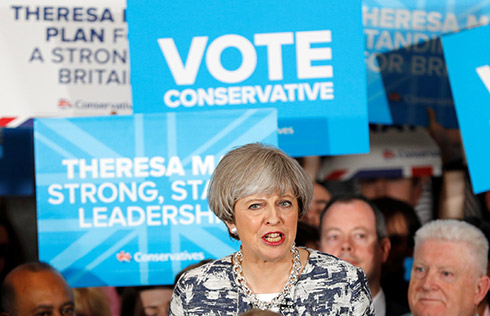Security overshadows UK election campaign
British Prime Minister Theresa May said she would change human rights laws to hinder terrorism suspects as British politicians entered the final day of campaigning before Thursday's general election.
The campaign has been unable to cast off the shadow of the terror attacks in Manchester and London and security will be tight around polling stations.
May said she would increase restrictions on people who were suspected of having terrorist intentions but had committed no crime.
"And if human rights laws stop us from doing it, we will change those laws so we can do it," she said.
Members of the Labour Party said that any attack on human rights would be a victory for terrorists and blamed the government for aggressively cutting spending on police, which allowed known suspects to operate freely.
The campaign has been characterized by very little discussion of Brexit, the issue that will dominate the next Parliament to the exclusion of almost everything else. Voters have been given no new information as to what leaders will do when negotiations with the rest of the EU begin on June 19.
There are 46.9 million registered voters in the UK and they will vote to choose 650 members of Parliament to represent them. If one party gets at least 326 MPs, it will be able to form a government. If the largest party gets less than 326, it may have to form a coalition.
Opinion polls suggest that May's Conservatives are so far the favorite to win, leading the Labour Party by between 6-9 percent. The Liberal Democrats and the United Kingdom Independence Party trail far behind with around 8 and 5 percent.
Poor performance
The election in Scotland will be dominated by the Scottish Nationalist Party and in Northern Ireland by Sinn Fein and the Democratic Unionist Party.
Even if May wins, her victory will still be tainted by what British media has recently portrayed as a poor performance in the campaign. She was seen on many occasions unable to answer questions with anything other than pre-rehearsed sound bites.
Corbyn, by contrast, has appeared relaxed and confident as he addressed mass rallies all over the country. Younger voters have warmed to the Labour Party manifesto and its unashamed socialist agenda, but unless they overturn a historic reluctance to vote in the same numbers as the over-30s, the opinion polls are likely to be correct.
The enthusiasm of supporters and young voters does not appear to have persuaded other voters to change their opinion of Corbyn as an activist rather than politician, who is a staunch advocate of the ideas he adopted in the 1970s.


























